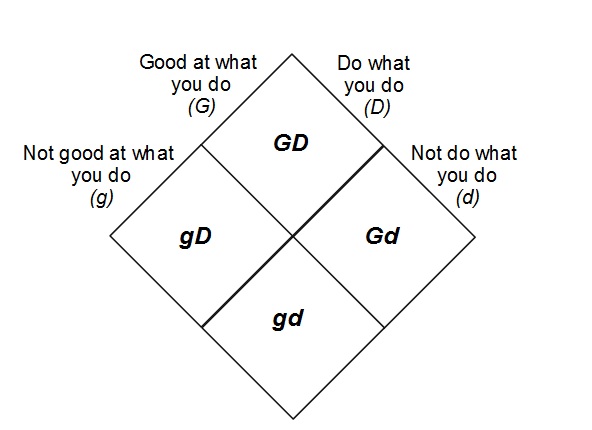By Spencer Quinn
Aedon Cassiel’s excellent Counter-Currents article “In Defense of Losers” made me think a lot about the nature of dissident political movements in general, and white ethno-nationalism in particular.
One of Cassiel’s points, made in the second half of his article, was that the more intelligent or successful whites—winners, presumably—tend to insulate themselves from the negative effects of racial diversity by being able to afford to live away from most non-whites and by typically encountering only those non-whites who are exceptional for desirable traits on their race’s bell curve. Less intelligent or successful whites—losers, presumably—cannot afford such insulation, and therefore will be more likely to personally observe the negative impacts of racial diversity.
It follows that most whites who are sympathetic to White Nationalism will spring from this latter subset of the white population because, presumably, they would be the most dissatisfied with racial diversity. Hence, any White Nationalist movement will contain a large number of “losers.”
I believe that this makes sense and that there’s quite a bit of truth in it (as there is in the entirety of Cassiel’s article, which I am by no means paraphrasing in toto here). Cassiel also does of a good job of dispelling the White Nationalist loser notion as peddled by our nation’s elites while sticking to the discussion’s original terminology. However, I also believe that with some effort this argument could be taken a little further.
Let me back up first and define the terms “winner” and “loser” before applying these concepts to White Nationalism. As a caveat, I am only offering these definitions as they apply to white men since there are far fewer white women seriously involved in White Nationalism at this time. Also, these definitions are mine alone, and may or may not correspond with the epithets “winner” and “loser” as they are commonly used.
So, defining “winner” is easy; it’s someone who isn’t a loser.
Okay, then, what is a loser?
When I was in high school and college, a “loser” was simply someone who was socially maladapted, a person who had few if any friends and no credible hope for serious attention from the opposite sex. Because such a person earns this distinction in an environment in which no one has to work or fight to survive, I would refer to this person as a “Scholastic Loser.” In a scholastic setting, most people who aspired to be winners avoided losers as much as possible since it was socially backward to be around them. Their loser-ness permeates space like a bad smell. In hindsight, this has all the pettiness of the bureaucratic snobbery and groveling found in Gogol’s or Dostoevsky’s Russia, but that’s just the way it was.
For example, I was neither a winner nor loser in college, but starting out I was certainly much closer to the loser end of the spectrum. Still, with some work over a few years, I was able to eke my way towards the center of the spectrum and enjoy a somewhat respectable social life. One night, as I was planning a trip to a club across town and entertaining not-quite-so-unrealistic hopes of meeting girls from other colleges there, a friend asked if he could tag along. I was crestfallen. This friend occupied the ninety-ninth percentile of loserdom as if it were a decrepit port-a-potty. He was a nice guy and I liked him fine, but he was tedious and annoying and not terribly good looking. But because we were in the same broad social circle and because I just didn’t have the heart to hurt him, I couldn’t say no. I already had the handicap of being a little more than half-loser myself, and with this guy hanging around my neck like an albatross, the night was shot before it could even begin.
In a scholastic milieu, being a winner or loser loosely correlates with attributes such as looks, physical stature, money, wittiness, accomplishment (academic or athletic, usually), and how much beer you can guzzle. But the most important attributes are the ability to attract the opposite sex and the ability to embarrass. The former makes others respect you; the latter makes others fear you. When I was in graduate school years later, I had a snide, hipster colleague who thought he could be rude to me. One cutting, sarcastic dig from me however—in front of a couple pretty girls, no less—and he was happy to see me from then on.
Once you get into the real world, of course, things change and make all this scholastic business seem quite juvenile in retrospect. When you have to struggle for survival and provide for other people, society correctly values different aspects of a man. For a man to be considered an “Adult Winner,” he must A) be good at what he does, and B) do what he does. If he can do one of these things and not the other, then he is part-winner and part-loser. If he can’t do either, then he is all loser. It’s really that simple. If a man can fulfill these two criteria, then in the vast majority of cases, he will be able to at least earn a living, attract the opposite sex, and accomplish a good chunk of what he wants in life. All the rest (looks, height, fitness, wit, intelligence, etc.) matters less, with the caveat that being rich accomplishes A and B in one fell swoop since what a rich man does is “whatever he wants.”
As proof of my Adult Winner-Loser theory, I present exhibit A, one Michel Petrucciani.
This was a fascinating man, born in France in 1962, with an incurable genetic disorder called osteogenesis imperfecta. Osteogenesis imperfecta in its more extreme forms causes short stature, brittle bones, constant pain, and pulminory problems. It is also inheritable, saddling each of its victim’s offspring with varying chances of being afflicted as well. Oh, and it can also kill you young, with victims of certain types of the disease rarely living a normal lifespan (Petrucciani, all three feet of him, made it to 36).
The reason why I bring up Michel Petrucciani is because he was a true winner in my little schema. In spite of horrific adversity, the man was an extremely talented and successful jazz pianist. He released over thirty recordings and was awarded the Légion d’honneur in Paris in 1994. Furthermore, he had girlfriends, even wives. (!) Pretty ones, too. Check out two of them, here and here. One of these ladies even bore him a child who, predictably—and tragically—enough, was afflicted with the same disease as his father.
In a social science sense, Michel Petrucciani is the perfect specimen to test my Adult Winner-Loser theory because he controls for almost every possible independent variable that would attract the opposite sex except for criteria A and B above, which become the dependent variables. Pretty much the only thing he had going for him was that he was extremely good at what he did, and he did what he did. This and this alone explains how this scrunched up little genius got more damnable action than a good chunk of us.
(Yes, Michel Petrucciani was a nice guy, but so was my college friend of the decrepit porta-potty, for all the good it did him.)
I imagine a Punnett Square of the Adult Winner-Loser breakdown would look something like this:
And just like in genetics, a person can have many Punnett Squares describing different things he may be good or bad at, which places winners and losers on a continuum, rather than in a stark black-white dichotomy. Our mainstream elites would have us believe that White Nationalism either consists of Scholastic Losers or Adult Losers of the gd variety. The former never reversed their social backwardness, and latter are no good at what they do and are unemployed besides. And yes, there are people like this among White Nationalists as there are among members of any dissident group.
But what our elites don’t count on are losers of the Gd variety also being attracted to White Nationalism. These are white men who are talented, intelligent, and driven, but who are excluded or hindered from their chosen careers or forced to conform to modern, politically correct standards which clearly disadvantage “pale males” like them. They are made into “losers” through no fault of their own, and from this pool White Nationalism draws some of its best thinkers and leaders. Think Wilmot Robertson resorting to the classic underground publication Instauration or Sam Francis being fired from the Washington Times or Peter Brimelow being let go from National Review or the safe, cushy life Kevin MacDonald could have lived had he simply dropped the Jew thing years ago. A lot of our best people have suffered outright rejection from the mainstream in one way or another or certainly expect to if they ever get doxed. As a result, they have little invested in mainstream society and would care even less if it were to come crashing down. As we all know, having little to lose also encourages risk taking. It makes one dangerous. What comes around, goes around with unjust rejection. Ultimately, the rejected party bites back twice as hard.
Now, I have to be very careful here lest I give the impression that all White Nationalists are losers. They are not; not by a long shot. I’m sure there are many perfectly successful and well-adjusted WD folks who do more than just sympathize with us and read our blogs. As I have stated before, “winners” and “losers” in this instance are not the commonly-used epithets we’re so familiar with but objective jargon established to make a point within this limited context. Most importantly, they are not static, with many losers being transformed into winners once they become White Nationalists and put in the serious effort and sacrifice necessary to make this thing work.
I believe this is something else our mainstream elites did not count on.


No comments:
Post a Comment